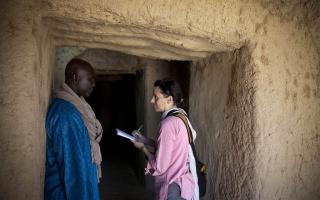Leadership Skills for Programme Support and Administrative Functions
The UN System Leadership Framework acknowledges that leadership skills are not only for those who manage people or teams; they are essential for all staff to efficiently manage processes, make decisions, and communicate with others. This workshop focuses on how General Service, Programme Support and Administrative Professionals can use the principles articulated in the UN System Leadership Framework to strengthen their impact.
The 2030 Agenda challenges the United Nations(UN) system to change the way it does business. This requires transforming the organizational culture.
The UN System Leadership Framework, adopted by the Chief Executives Board in 2016 and embraced by the Secretary-General in his report on management reforms of the UN Secretariat, provides the blueprint for the desired UN organizational culture, and of the underpinning leadership characteristics. Because leadership can and should be exercised not only by formally designated leaders but by all staff, the framework applies to UN staff, at all levels, in all functions, and in all locations.
Upon successfully completing this workshop, participants will be able to:
- Discuss the practical application of the UN Leadership Framework for programme support and administrative services
- Explain the characteristics of UN leadership – Norm-based, principled, inclusive, accountable, multidimensional, transformational, collaborative, self-applied
- Apply systems thinking for administrative efficiency in implementing the UN leadership framework
- Focus on impact and accountability
- Develop self-leadership skills
- Enable and support change
- Apply the design-thinking approach
- Support transformational change
The workshop employs an adult learning approach characterized by a participatory and interactive training style. It engages participants in practical exercises and group work. Case studies and best practices to allow the application of the UN leadership framework to real-life situations.
The course consists of one online instructor-led sessions and face-to-face sessions in Turin, Italy
The online component will last for three weeks, three webinars spread over five weeks(21 October – 22 November 2024).The webinar takes place every other week.
Each webinar week, participants go through assigned modules and reading materials, complete assignments and exercises. They also post to discussion forums to share experiences, questions and comments, and receive feedback from the instructors. Thereafter, participants will attend a face-to-face, 3.5 days sessions, 3 - 6 December 2024, to complement learned skills, practice and receive feedback from peers and the instructor.
The face-to-face component will take place in Turin, Italy
Webinar details
The webinar sessions will be conducted on the Zoom online platform. Self-paced modules and discussion forums for each week of the course will be designed and structured on the UNKampus30, UNSSC’s Learning Platform.
Participants need a computer (or mobile device), a reliable internet connection and either headset with microphone to connect to the audio through the computer, or a telephone. We recommend accessing audio through the computer. No special software is required, but participants must be able to access Zoom so please check the admin rights on your computer. We will send instructions for Zoom access to registered participants. We recommend you download the application and test your access in advance.
The online live sessions are from 2:00 pm – 4:00 pm Rome-time (8:00 am – 10:00 am New York-time).
This programme builds upon and complements other UNSSC courses for administrative assistants with the following activities:
Online sessions (3 components spread over 5 weeks)
Week 1: UN Leadership Framework: New ways of working for the 2030 Agenda
This session focuses on understanding the characteristics of UN leadership which are –norm-based, principled, inclusive, accountable, multidimensional, transformational, collaborative and self-applied.
It also covers the four key ways in which leadership behaviours manifest themselves in support of the 2030 Agenda. These include, Focus on Impact; Driving Transformational Change; Systems-Thinking; and Co-creation.
Leadership, Accountability and Results Driven:Taking responsibility and ownership for decisions, actions and results. Being accountable for what is accomplished and how.
Week 3: Leadership Charisma: Emotional Intelligence and Leadership behaviour
Operationalizing the universal leadership characteristics, behaviours, principles and mindsets envisioned in the UN leadership framework. This session covers the effect of emotional intelligence on leadership effectiveness, self-leadership and self-management. It also covers how the way we deal with our emotions shapes our actions, careers, relationships, health and happiness.
Week 5: Leadership and System-Thinking - Leadership Culture
To achieve a leadership culture, the power of systems thinking needs to spread throughout the organization. Thinking in terms of systems gives people the ability to enable and support change where it is most needed.
Face-to-Face sessions (3.5 days)
The face-to-face sessions are designed to take participants through hands-on exercises and case studies. These will enable them to put into practice what they have learned in the online sessions, likewise develop their leadership capacity.
General Service programme support and administrative professionals.
The course fee of $2200 covers all tuition-related costs, including learning materials, access to online platforms, etc.





